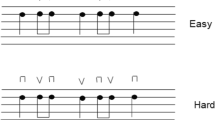Abstract
The effects of learning on strategy selection in the context of action imitation have been investigated in two experiments conducted with healthy individuals. It was predicted that, once learnt, meaningless actions are processed by the cognitive system as meaningful and this new representational status might influence the process selection in action imitation. Results showed that not only were learnt meaningless actions processed in the same way as known, meaningful actions, but that they were imitated even better, probably due to their being represented only once in the episodic, long-term memory system. Our findings are interpreted in the light of a multiple route model for action imitation.



Similar content being viewed by others
References
Cooper R, Shallice T (2000) Contention scheduling and the control of routine activities. Cog Neuropsychol 17:297–338
Goldenberg G, Hartmann K, Schlott I (2003) Defective pantomime of object use in left brain damage: apraxia or asymbolia? Neuropsychologia 41:1565–1573
Grezès J, Costes N, Decety J (1999) The effects of learning and intention on the neural network involved in the perception of meaningless actions. Brain 122:1875–1887
Huber R, Ghilardi MF, Massimini M, Tononi G (2004) Local sleep and learning. Nature 430:78–81
Knowlton BJ, Squire LR (1995) Remembering and knowing: two different expressions of declarative memory. J Exp Psychol Learn Mem Cogn 21:699−710
Oldfield RC (1971) The assessment and analysis of handedness: the Edinburgh inventory. Neuropsychologia 9:97–113
Pobric G, Rumiati RI (2006) Visual recognition of actions: time matters. J Exp Psychol Hum Percept Perform (under revision)
Rumiati RI, Humphreys GW (1998) Recognition by action: dissociating visual and semantic routes to action in normal observers. J Exp Psychol Hum Percept Perform 24:31–647
Rumiati RI, Tessari A (2002) Imitation of novel and well-known actions: the role of short-term memory. Exp Brain Res 142:425–433
Shadmehr R, Brashers-Krug T (1997) Functional stages in the formation of human long-term motor memory. J Neurosci 17:409–419
Shadmehr R, Thoroughman K (2000) Learning and memory formation of arm movements. In: Winters JM, Crago PE (eds) Biomechanisms and neural control of movements. Springer, Berlin Heidelberg New York, pp 347–353
Stickgold R, Walker MP (2005) Memory consolidation and reconsolidation: what is the role of sleep? Trends Neurosci 28:408–415
Tessari A, Rumiati RI (2004) The strategic control of multiple routes in imitation of actions. J Exp Psychol Hum Percept Perform 30:1107–1116
Vitkovitch M, Humphreys GW (1991) Perseverative responding in speeded naming to pictures: it is in the link. J Exp Psychol Learn Mem Cogn 17:664–680
Vitkovitch M, Humphreys GW, Lloyd-Jones TJ (1993) On naming giraffe a zebra: Picture naming errors across different categories. J Exp Psychol Learn Mem Cogn 19:243–259
Walker MP, Stickgold R (2006) Sleep, memory, and plasticity. Annu Rev Psychol 10:139–166
Walker MP, Brakefield T, Hobson JA (2003) Dissociable stages of human memory consolidation and reconsolidation. Nature 425:616–620
Walker MP, Stickgold R, Alsop D, Gaab N, Schlaug G (2005) Sleep-dependent motor memory plasticity in the human brain. Neuroscience 133:911–917
Weeks DL, Hall AK (1996) A comparison of imitation strategies in observational learning of action patterns. J Motor Behav 28:348–358
Zimmer HD, Engelkamp J (1989) Does motor encoding enhance relational information? Psychol Res 51:158–167
Zimmer HD, Engelkamp J (1996) Routes to actions and their efficacy for remembering. Memory 4:59–78
Acknowledgements
The procedure of all the experiments contained in the study was approved by the ethical commission of S.I.S.S.A. (Scuola Internazionale di studi Avanzati). This study was supported by grants to Raffaella Ida Rumiati from the MIUR (PRIN 2004-2005).
Author information
Authors and Affiliations
Corresponding author
Rights and permissions
About this article
Cite this article
Tessari, A., Bosanac, D. & Rumiati, R.I. Effect of learning on imitation of new actions: implications for a memory model. Exp Brain Res 173, 507–513 (2006). https://doi.org/10.1007/s00221-006-0395-9
Received:
Accepted:
Published:
Issue Date:
DOI: https://doi.org/10.1007/s00221-006-0395-9




